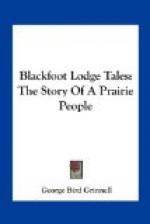“We ought to have a storehouse over here on Cut Bank, so that we will not be obliged each week to go over to the agency to get our food. It takes us a day to go, and a day to come, and a day there; nearly three days out of every week to get our food. When we are at work cutting hay, we cannot afford to spend so much time travelling back and forth. We want to get our crops in, and not to be travelling about all the time. It would be a good thing, too, to have a blacksmith shop here, so that when our wagons break down, we will not have to go to the agency to get them mended.”
This is merely the substance of a much longer speech, to which I replied by a series of questions, something like the following:—
“Do you remember talking to me last year, and telling me on this same spot that you ought to have beef issued to you here, and ought not to have to make the long journey to the agency for your meat?” “Yes.”
“And that I told you I agreed with you, and believed that some of the steers could just as well be killed here by the agency herder and issued to those Indians living near here?” “Yes.”
“That change has been made, has it not? You now get your beef here, don’t you?” “Yes.”
“You know that the Piegans have a certain amount of money coming to them every year, don’t you?” “Yes.”
“And that some of that money goes to pay the expenses of the agency, some for food, some to pay clerks and blacksmiths, some to buy mowing-machines, wagons, harness, and rakes, and some to buy the cattle which have been issued to you?” “Yes.”
“Now, if a government storehouse were to be built over here, clerks hired to manage it, a blacksmith shop built and another blacksmith hired, that would all cost money, wouldn’t it?” “Yes.”
“And that money would be taken out of the money coming next year to the Piegans, wouldn’t it?” “Yes.”




